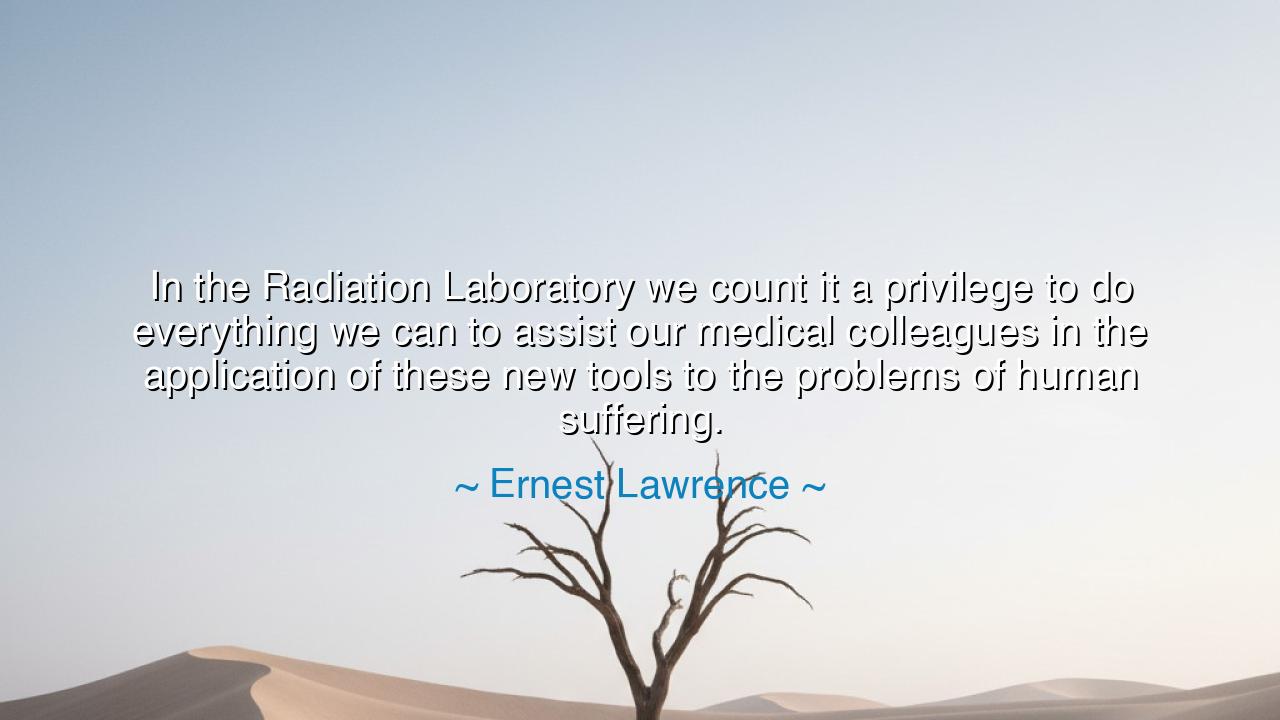
In the Radiation Laboratory we count it a privilege to do
In the Radiation Laboratory we count it a privilege to do everything we can to assist our medical colleagues in the application of these new tools to the problems of human suffering.






In the noble words of Ernest Lawrence, there shines the spirit of a man who bridged the realms of discovery and compassion: “In the Radiation Laboratory we count it a privilege to do everything we can to assist our medical colleagues in the application of these new tools to the problems of human suffering.” Though spoken in the language of science, these words carry the timeless tone of devotion — a reverence not for power, but for purpose. They remind us that knowledge, when joined with mercy, becomes not a weapon of pride, but a tool of healing; not a monument to the mind, but an offering of the heart.
The meaning of this statement reaches far beyond the confines of a laboratory. It speaks to the sacred union between intellect and empathy, between invention and humanity. Lawrence, a physicist and inventor of the cyclotron, stood at the dawn of a new age when the invisible forces of the atom were being revealed to human understanding. Yet even as he beheld the vast potential of these discoveries, he saw their highest purpose not in domination or destruction, but in service to mankind. To “assist our medical colleagues,” as he said, was not a duty of the mind alone, but a privilege of the soul — to turn the light of knowledge toward the shadow of suffering.
The origin of these words lies in Lawrence’s work at the University of California’s Radiation Laboratory, where the seeds of modern nuclear medicine were planted. There, physicists and physicians stood side by side, learning to use radiation not merely as an instrument of research, but as a means to heal — to shrink tumors, to diagnose disease, to pierce the mysteries of life itself. It was an age of wonder and uncertainty, when the same powers that could heal could also destroy. Yet Lawrence’s vision was clear: science must be guided by compassion, for only then does discovery serve its highest calling. His words thus became a moral compass for generations of scientists to come.
To understand the depth of his spirit, one may recall the tale of Marie Curie, who decades earlier had borne the same flame of discovery. She too harnessed the power of radiation, but her aim was not conquest — it was care. During the First World War, she transformed her research into action, creating mobile X-ray units to aid wounded soldiers on the front lines. Like Lawrence, she believed that the fruits of science must be given to alleviate human pain. And though her body would one day bear the scars of her own discoveries, her legacy — like his — became a testament to the truth that knowledge without compassion is barren, while knowledge guided by love endures.
Lawrence’s words also echo the ancient wisdom of those who saw service as the highest virtue. In the teachings of Hippocrates, the physician’s oath was not to glory, but to mercy: to “do no harm,” to treat the suffering as sacred trust. In the same spirit, Lawrence’s statement is a vow of the scientist — that innovation must not lose sight of humanity. It is a reminder that every great power discovered by the human mind carries with it a moral responsibility — to use it for life, not for death; for hope, not for fear. The scientist, like the healer, must walk a path both brilliant and humble.
There is also, within his words, a call to gratitude — “we count it a privilege,” he says. How rare it is in our modern age to see work spoken of not as burden, but as blessing. To Lawrence, the act of contributing to the easing of human suffering was not mere labor, but honor. He saw himself as part of a greater harmony — a chain of compassion that stretched from the physicist’s laboratory to the doctor’s hands to the patient’s recovery. This humility transforms science into art, and work into worship. It reminds us that even the most technical task gains meaning when it is done in the service of others.
The lesson we inherit from Lawrence’s words is both simple and profound: that knowledge must be tempered by kindness, and progress must always walk hand in hand with purpose. Let every worker — whether scientist, doctor, teacher, or craftsman — remember that their skill is not their own possession, but a gift meant for the greater good. Let us count it, as he did, a privilege to serve, to create, to heal. For when intellect bows to compassion, and when power serves love, then humanity moves not only forward in knowledge, but upward in wisdom.
So let these words of Ernest Lawrence be carried as a torch through the corridors of every age: that the truest glory of science is not in its discoveries, but in its devotion to life. May we, too, strive to join the mind with the heart, and the pursuit of knowledge with the service of mercy. For in doing so, we transform our work — whatever it may be — into a living act of hope, and our progress into a hymn for all humankind.






AAdministratorAdministrator
Welcome, honored guests. Please leave a comment, we will respond soon